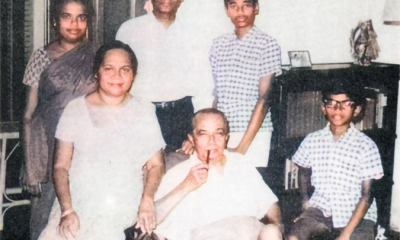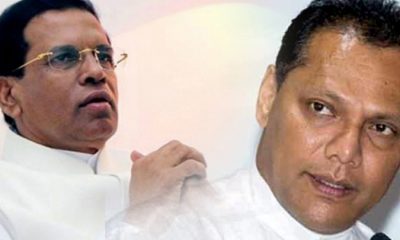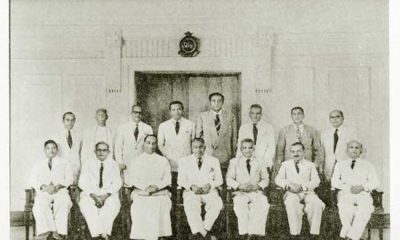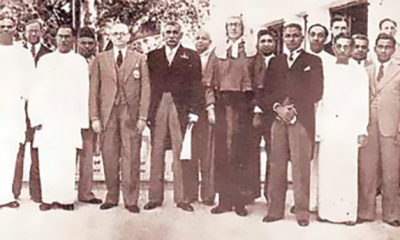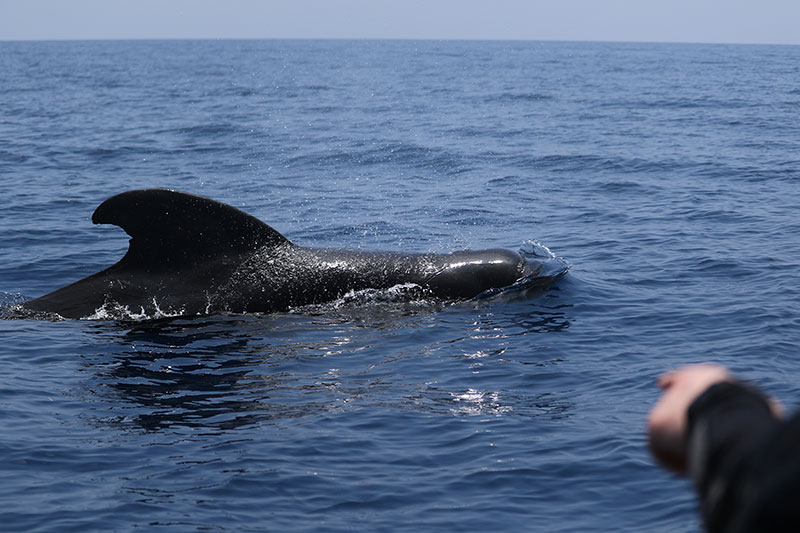Features
1956, SWRD, Sir John, some ministers and drafting a Throne Speech on short order

(Excerpted from the Memoirs of a Cabinet Secretary by BP Peiris)
In view of the dissolution of Parliament, I sat down to draft the Queen’s Speech. I drafted five different speeches, one for each person who might be a potential Prime Minister: Sir John, S.W.R.D., Philip Gunawardena, Dahanayake and N. M. Perera. The elections were spread over three days, and on the last day, April 12, 1956, was S.W.R.D.’s election at Attanagalla.
On the first day’s results, it was clear that there was a swing towards S.W.R.D.’s party, the Mahajana Eksath Peramuna. On the second day’s results, his position had considerably improved and it was clear to any thinking man that, if S.W.R.D. won his own seat on the 12th, he would automatically be Prime Minister.
The shortness of the time given for the drafting of the Queen’s Speech must have struck him as a constitutional lawyer because, on the 12th morning, while polling in his electoral area was going on, he asked me on the telephone to come to his bungalow to draft the Speech.
DS.’s and Dudley’s Secretary was N. W. Atukorale. When Sir John came in, Atukorale was elevated to Queen’s House and P. Nadesan took his place. Nadesan was an efficient officer and was known as Sir John’s man. He was able to write a speech for Sir John for the opening of a Commonwealth Conference or a Volley Ball court. If S.W.R.D. came in, everyone knew that Nadesan had to go; and he went.
Many, including my father, thought that I would have to go likewise although I saw no reason for taking a kick. When S.W.R.D. phoned over the Queen’s Speech, I told him that I did not mean any disrespect, that I wished to act constitutionally as Secretary to the Cabinet, that Sir John was still the Prime Minister, that he was not still member for Attanagalla, that I had no doubt that he would be elected, that I knew the urgency of the matter, that I had a draft ready, and that I would see him early the next morning with Sir John’s permission.
In the afternoon of the 12th, I drove to Kandawala. Sir John, dressed in a sarong and banian, was signing cheques for each of the minor employees of the External Affairs Ministry. When I explained my problem, he readily granted me permission to see SWRD. He then invited me to a drink. As it was only five o,clock, I said I would prefer a glass of iced water, and he said “You b…, you are also refusing my drinks, now that I am down?”
I said it was not that, that I had some drinks at lunch time, and that my throat was a bit parched. He was annoyed but asked the servant boy to bring two glasses of iced water. When I was there, Sir John’s house which is normally full of people was deserted by those who pretended to be his friends and enjoyed his hospitality while he was in power.
And so, the next morning, at 6. 30, I was on SWRD.’s doorstep at Rosmead Place. He had been returned by an enormous majority and was to be our next Prime Minister. I inquired from a servant boy whether the master was up and was told that he was reading a mass of newspapers. I sent my name in and was asked to come upstairs – I went in, in some trepidation, and again told him, that I meant no disrespect and that I was there with Sir John’s permission, and that at Sir John would be handing in his resignation as Prime Minister at noon.
SWRD. then made a short speech at me in a very loud voice. He said he saw no disrespect but complete integrity, that public officers from Government Agents down to village headmen had worked against him (“against me, against me” he shrieked about three times) in the election, and that he admired the correct and upright stand I had taken. He said I was the one public servant, he knew, who had acted correctly during the election. I knew now that I had saved my skin. He asked for my draft and read the three pages which I had written, slowly and carefully. He then took a blue pencil and cancelled all three pages saying “Pedestrian English Peiris, pedestrian English Take this down”, and with his usual intellectual superiority and arrogance, started dictating.
He was naturally elated at his success at the election and his future as the Head of the country. Several times I had to ask him to go slow on his dictation because I knew no shorthand, and he said “Sorry, my dear fellow”. What he dictated to me was not a Queen’s speech but a vitriolic attack on Sir John and the United National Party, an attack which he should properly have made on the floor of the house of Representatives or at a public meeting.
At the end of his dictation, I thought it my duty to point this out, which I did, adding that the Governor-General might refuse to read the Speech. There is the instance of King George V refusing to read a Speech until some objectionable words referring to His Irish subjects had been deleted. He said “take my order”.
While he was dictating to me, the servant boy was coming up every few minutes saying that another gentleman had arrived, and this was before seven o’clock in the morning. SWRD. was unwashed and unshaved and dressed in pyjamas and a dressing gown, not in the shirt and cloth. He was an Oxford man, and an Oxford man cannot easily slough his culture.
About the servant boy’s tenth visit, he lost his temper and shouted at the boy to tell them all to clear out of his house. I reminded him that he was now the Prime Minister and that his remark, if conveyed, would make a very bad beginning. I suggested that he go down as he was, in his dressing gown, see who these gentlemen were, and ask to be excused because he was extremely busy about the formation of a Cabinet and time was short.
He agreed and we both descended the stairs, he with one arm round my shoulder, and I with the draft of the Queen’s Speech under my arm. Before he lost his temper, he had suggested that I wait for bacon and eggs – Oxford again.
I cannot describe my surprise when I came down and saw who the gentlemen were who were calling so early in the morning on the new Prime Minister. They were all gentlemen in high places who used to frequent Kandawala and who had done a quick somersault and a long jump to the winning side. ‘Gosh,’ I thought, ‘aren’t there any decencies in life? What they were there for, I never found out because SWRD ordered me to get back to my office and get on with the job I had in hand.
The senior hands on my staff had dealt with the Queen’s Speech since 1974 and they were surprised when they read the draft in my long-hand before they typed it. They came to me and asked “Is this the Queen’s Speech?” And I said “No. This is Mr Bandaranaike’s speech. I am not going to have this printed”.
When the draft was typed, I took it back to Rosmead Place and asked S.W.R.D. to read in type what he had dictated to me. I told him that the language was far too strong and had to be toned down. He was calmer now; the first flush of victory and elation had receded and he was giving his mind to more urgent and important things like Cabinet-making. He again read the draft carefully, said that he agreed with me and asked me to tone it down.
I asked him whether he wished to see the second draft; time was running short. He said, “Certainly not, my dear fellow. You tone it down; you know my ideas; I can trust your discretion; have your amended draft translated and printed”. As Prime Minister, he was a mellow man. As Minister of Local Government he had been a terror to his colleagues and to the public servants who worked in his Ministry.
His Permanent Secretary, E. W. Kannanagara, told me that he had to be the shock-absorber.
The Speech, toned down by me and read by the Governor-General in S.W.R.D.’s excellent English, contained promises which the Government could not possibly fulfil. A people’s Government had been returned and the people had to be pampered and pleased, whether the Government could afford the luxury or not.
At the Opening of Parliament, the People’s Ministers, including the Prime Minister, were in national dress, wearing blue scarfs to indicate the party. I was surprised to see Ministers M. W. H. de Silva and Stanley de Zoysa in this dress. M. W. H. looked dignified as a judge of the Supreme Court in a full-bottomed wig and gown. Stanley, with his monocle and that meticulous English pronunciation of his which reminded you of a University Don – well, really, you had to look at him twice before you could recognize him. To the Senate and the House of Representatives, Ministers went in the national dress. To the Cabinet, they came in the most nondescript attire.
The first paragraph of S.W.R.D.’s first Queen’s Speech read as follows:
“The free votes of the people democratically cast at the last general election are a clear indication of dissatisfaction with many aspects of policy and administration hitherto pursued. My Government intends, in pursuance of its declared policy, to effect many changes with expedition and efficiency, but in a manner which will neither result in injustice nor cause confusion and dislocation.”
1956,SWRD, Sir. John,
The Speech continued:
“My Government wishes to assure minorities, religious, racial and otherwise, that they need have no fear of injustice or discrimination in the carrying out of its policies and programmes. My Government will ensure to all citizens the rights, privileges and freedoms to which they are entitled in a democratic state.”
Compare this with the following sentence in the Speech:
“It will also take necessary steps for the adoption of Sinhala as the one official language of the State.”
Was the Sinhala only policy not a discrimination against a minority? Was the Assisted Schools takeover not an injustice? Was it a blow at the Roman Catholic community? Are these some of the changes which the Government intended to effect with expedition and efficiency? If these were, then, many more were to follow in the years to come, some overtly, some surreptitiously and yet others by camouflage.
In SWRD.’s Cabinet there was one woman. There was also Dahanayake, later to be Prime Minister, who was always punctual and who came barefooted to meetings with a bottle of eau de cologne and, before he gave up smoking, with a tin of Peacock cigarettes. C. P. de Silva was a double first in mathematics and excelled, by reason of his previous experience as a Civil Servant, in matters relating to land and irrigation.
M. W. H. de Silva, Q. C., Minister of Justice and a kinsman of mine had held high office; he had been a Judge of the Supreme Court and our High Commissioner in India. His nickname in Hultsdorp was the ‘mule’ because, once he had made up his mind, nothing would make him change it. To illustrate this, I shall relate an incident which took place when I was an Assistant Legal Draftsman drafting the Constitution and he was Acting Legal Secretary.
A telegram had come from the Secretary of State asking for an amendment to be drafted on certain lines. M. W. H. told me the lines on which to draft. This was, in my opinion, not the lines that the Colonial Office intended, but I did not tell him so. Instead, I discussed the matter with D. S. Jayawickrama, Assistant Legal Secretary and E. H. T. Gunasekera, Crown Counsel, both of whom agreed that my interpretation of the telegram was right and that M. W. H. was wrong.
I accordingly ignored the Acting Legal Secretary’s order and drafted according to what I thought the Secretary of State wanted and took the draft to M. W. H. to be told “This is not what I want. Please draft on these lines”. I told him politely that I did not think that his interpretation of the telegram was correct, and he, equally politely, told me not to waste his time but to draft as directed by him.
I therefore went and prepared a fresh draft, but was careful to send it to him with a letter in which I said that the draft gave effect to his oral instructions but, in my opinion, did not give effect to the Secretary of State’s instructions as set out in his telegram. My second draft was telegraphed to England and soon there came back a telegram saying that the draft was not what they wanted.
M. W. H. sent for me and asked me to re-draft and I said “I told you, Sir”. All that the mule said was “Well, your job is to draft. Draft again”. I said “Here’s my first draft which you rejected earlier” and he was compelled to accept it. Except for this idiosyncrasy, he was a straight and honest and upright man, pleasant in his manner, with a sense of wit and humour. During a Cabinet discussion in which he was not interested, he would doodle, always the figure of a female.
There was William Silva, young in years, as Minister of Industries. He appeared to understand his work and the nature of his duties and made a useful contribution to the discussion. In charge of Finance was Stanley de Zoysa, an old Royalist, about two years senior to me at school, and an exceedingly polite man. Philip Gunawardene, Minister of Agriculture and food must, as a student, have spent long hours poring over Das Kapital. I had never met him before, but when I was a student in London, I had seen him addressing the mob on Sundays in Hyde Park from a soap box – a platform called the Indian Freedom League.
He always wore a canary jersey, and was a very effective and forceful speaker, with plenty of venom against the Britisher, ready wit and repartee. I mentioned this fact to him at his first meeting when I introduced myself, and he agreed that my memory was correct. He is the only Minister I have worked with since the beginning of Cabinet Government who came to a meeting thoroughly prepared, not only on his own memoranda, but also on the papers submitted by other Ministers. He would bring with him a number of Sessional Papers, Administration Reports and other official documents not referred to in the other Ministers Cabinet Papers but relevant to the issue. When he spoke, he never failed to make a useful contribution to the discussion.
As Minister of Agriculture, he was in charge of Paddy Lands and brought what the landowners thought was a revolutionary Bill. As Minister of Food, he was in charge of the Co-operative Wholesale Establishment. In all his functions, he was inclined to take as much legislative power as possible into his hands. This, the other Ministers resented, particularly, the Prime Minister. Philip was definitely of the Left. SWRD, in spite of his public statements that he was for democratic socialism or for socialistic democracy or for the middle path or for pancha sila (he was so clever in stating or not stating his position that I think nobody ever understood what exactly he stood for) was inclined towards the Right. A rift had to come, and it came. Philip’s draft legislation, submitted for Cabinet approval, gave the Cabinet the idea that he, and not SWRD was to be the virtual dictator. What with the Paddy Lands Act, the Multipurpose Cooperative Societies, the People’s Bank and the Co-operative Banking system, and a heap of other legislation he proposed, he would have been in a position to wield tremendous power in the country.
These proposals were obviously put forward to implement his political creed and not for the furtherance of his personal position. I believe he was an honest man, not capable of being bribed or influenced. When be was annoyed, his reaction was violent.
Among the other Ministers were Mrs Wimala Wijewardena, Messrs A. P. Jayasuriya, Kuruppu, Marikkar and Maithripala Senanayake.
The Cabinet came to certain decisions at its first meeting. Ministers had no time to formulate their thoughts in memoranda and the discussion was on very general points. As a People’s Government, they did not believe in Honours and decided that no recommendation should be made to Her Majesty the Queen for the conferment of Imperial Honours on citizens of Ceylon and that Her Majesty be humbly and respectfully requested to be graciously pleased to refrain from conferring such Honours on such of Her subjects as were Ceylon citizens.
Some Ministers thought that the appointment of an advocate to be a Queen’s Counsel was the conferment of an Imperial Honour. Local honours suffered the same fate. Our Diplomatic Missions abroad, Ministers and public officers were informed that no alcoholic liquor was to be served at official functions. The Senate and the House of Representatives were requested to close their bars: the House acquiesced, the Senate refused.
The Prime Minister informed his Ministers that it was his intention to obtain the services of an expert from the United Kingdom to advise the Government with regard to the nationalization of the transport services. On the budget drastic changes could not be made as the budgetary proposals for the next financial year had already been drawn up by the public officials concerned. While accepting the general structure of the next budget, Ministers were requested to include, wherever possible, in the draft estimates, all necessary items in furtherance of the policy of the Government and to omit any items which were in conflict with that policy.
With a view to bringing down the cost of living, it was proposed to reduce the price of rice and sugar. It was pointed out that a reduction in the price of rice by one cent a measure would mean an annual loss to revenue of seven million rupees, and a similar reduction in the price of sugar would mean a loss of three million rupees. In spite of the difficult financial position, something had to be done by the Government, and it was agreed to reduce the price of rice by ten cents a measure and the price of sugar by five cents a pound.
The Minister was asked to explore the possibility of buying sugar direct on a Governmental basis with a view to eliminating middlemen and reducing the cost to the consumer. The Governments of the United States of America and the Union of Soviet Socialist Republics made offers of economic aid which the Cabinet gratefully accepted.
The Cabinet considered seriously the question of abolishing the death penalty for murder, although the murder rate in Ceylon was probably the highest in the world. We had a Buddhist teetotal Minister of Justice, M. W. H., who was strongly in favour of the proposal, and he persuaded the Cabinet to agree to a suspension of the death penalty for a period of three years in the case of murder, abetment of murder and abetment of suicide. A sentence of life imprisonment was substituted.
On July 7, 1956, the Official Language Act, declaring Sinhala to be the one Official Language in Ceylon, came into operation. This immediately split the country into two, separating the Sinhalese from the Tamils whose ancient language had been removed from the scene altogether. This controversial piece of legislation antagonized the entire Tamil community and, for the first time after years of DS’s strenuous efforts to make the numerous races and communities, religious and otherwise, of the country into one homogeneous whole, the country was being divided by SWRD.’s Sinhala only Act.
Features
Ramadan 2026: Fasting hours around the world

The Muslim holy month of Ramadan is set to begin on February 18 or 19, depending on the sighting of the crescent moon.
During the month, which lasts 29 or 30 days, Muslims observing the fast will refrain from eating and drinking from dawn to dusk, typically for a period of 12 to 15 hours, depending on their location.
Muslims believe Ramadan is the month when the first verses of the Quran were revealed to the Prophet Muhammad more than 1,400 years ago.
The fast entails abstinence from eating, drinking, smoking and sexual relations during daylight hours to achieve greater “taqwa”, or consciousness of God.
Why does Ramadan start on different dates every year?
Ramadan begins 10 to 12 days earlier each year. This is because the Islamic calendar is based on the lunar Hijri calendar, with months that are 29 or 30 days long.
For nearly 90 percent of the world’s population living in the Northern Hemisphere, the number of fasting hours will be a bit shorter this year and will continue to decrease until 2031, when Ramadan will encompass the winter solstice, the shortest day of the year.
For fasting Muslims living south of the equator, the number of fasting hours will be longer than last year.
Because the lunar year is shorter than the solar year by 11 days, Ramadan will be observed twice in the year 2030 – first beginning on January 5 and then starting on December 26.

Fasting hours around the world
The number of daylight hours varies across the world.
Since it is winter in the Northern Hemisphere, this Ramadan, people living there will have the shortest fasts, lasting about 12 to 13 hours on the first day, with the duration increasing throughout the month.
People in southern countries like Chile, New Zealand, and South Africa will have the longest fasts, lasting about 14 to 15 hours on the first day. However, the number of fasting hours will decrease throughout the month.

[Aljazeera]
Features
The education crossroads:Liberating Sri Lankan classroom and moving ahead

Education reforms have triggered a national debate, and it is time to shift our focus from the mantra of memorising facts to mastering the art of thinking as an educational tool for the children of our land: the glorious future of Sri Lanka.
The 2026 National Education Reform Agenda is an ambitious attempt to transform a century-old colonial relic of rote-learning into a modern, competency-based system. Yet for all that, as the headlines oscillate between the “smooth rollout” of Grade 01 reforms and the “suspension of Grade 06 modules,” due to various mishaps, a deeper question remains: Do we truly and clearly understand how a human being learns?
Education is ever so often mistaken for the volume of facts a student can carry in his or her head until the day of an examination. In Sri Lanka the “Scholarship Exam” (Grade 05) and the O-Level/A-Level hurdles have created a culture where the brain is treated as a computer hard drive that stores data, rather than a superbly competent processor of information.
However, neuroscience and global success stories clearly project a different perspective. To reform our schools, we must first understand the journey of the human mind, from the first breath of infancy to the complex thresholds of adulthood.
The Architecture of the Early Mind: Infancy to Age 05
The journey begins not with a textbook, but with, in tennis jargon, a “serve and return” interaction. When a little infant babbles, and a parent responds with a smile or a word or a sentence, neural connections are forged at a rate of over one million per second. This is the foundation of cognitive architecture, the basis of learning. The baby learns that the parent is responsive to his or her antics and it is stored in his or her brain.
In Scandinavian countries like Finland and Norway, globally recognised and appreciated for their fantastic educational facilities, formal schooling does not even begin until age seven. Instead, the early years are dedicated to play-based learning. One might ask why? It is because neuroscience has clearly shown that play is the “work” of the child. Through play, children develop executive functions, responsiveness, impulse control, working memory, and mental flexibility.
In Sri Lanka, we often rush like the blazes on earth to put a pencil in the hand of a three-year-old, and then firmly demanding the child writes the alphabet. Contrast this with the United Kingdom’s “Birth to 5 Matters” framework. That initiative prioritises “self-regulation”, the ability to manage emotions and focus. A child who can regulate their emotions is a child who can eventually solve a quadratic equation. However, a child who is forced to memorise before they can play, often develops “school burnout” even before they hit puberty.
The Primary Years: Discovery vs. Dictation
As children move into the primary years (ages 06 to 12), the brain’s “neuroplasticity” is at its peak. Neuroplasticity refers to the malleability of the human brain. It is the brain’s ability to physically rewire its neural pathways in response to new information or the environment. This is the window where the “how” of learning becomes a lot more important than the “what” that the child should learn.
Singapore is often ranked number one in the Programme for International Student Assessment (PISA) scores. It is a worldwide study conducted by the Organisation for Economic Co-operation and Development (OECD) that measures the scholastic performance of 15-year-old students in mathematics, science, and reading. It is considered to be the gold standard for measuring “education” because it does not test whether students can remember facts. Instead, it tests whether they can apply what they have learned to solve real-world problems; a truism that perfectly aligns with the argument that memorisation is not true or even valuable education. Singapore has moved away from its old reputation for “pressure-cooker” education. Their current mantra is “Teach Less, Learn More.” They have reduced the syllabus to give teachers room to facilitate inquiry. They use the “Concrete-Pictorial-Abstract” approach to mathematics, ensuring children understand the logic of numbers before they are asked to memorise formulae.
In Japan, the primary curriculum emphasises Moral Education (dotoku) and Special Activities (tokkatsu). Children learn to clean their own classrooms and serve lunch. This is not just about performing routine chores; it really is as far as you can get away from it. It is about learning collaboration and social responsibility. The Japanese are wise enough to understand that even an absolutely brilliant scientist who cannot work in a team is a liability to society.
In Sri Lanka, the current debate over the 2026 reforms centres on the “ABCDE” framework: Attendance, Belongingness, Cleanliness, Discipline, and English. While these are noble goals, we must be careful not to turn “Belongingness” into just another checkbox. True learning in the primary years happens when a child feels safe enough to ask “Why?” without the fear of being told “Because it is in the syllabus” or, in extreme cases, “It is not your job to question it.” Those who perpetrate such remarks need to have their heads examined, because in the developed world, the word “Why” is considered to be a very powerful expression, as it demands answers that involve human reasoning.
The Adolescent Brain: The Search for Meaning
Between ages 12 and 18, the brain undergoes a massive refashioning or “pruning” process. The prefrontal cortex of the human brain, the seat of reasoning, is still under construction. This is why teenagers are often impulsive but also capable of profound idealism. However, with prudent and gentle guiding, the very same prefrontal cortex can be stimulated to reach much higher levels of reasoning.
The USA and UK models, despite their flaws, have pioneered “Project-Based Learning” (PBL). Instead of sitting for a history lecture, students might be tasked with creating a documentary or debating a mock trial. This forces them to use 21st-century skills, like critical thinking, communication, and digital literacy. For example, memorising the date of the Battle of Danture is a low-level cognitive task. Google can do it in 0.02 seconds or less. However, analysing why the battle was fought, and its impact on modern Sri Lankan identity, is a high-level cognitive task. The Battle of Danture in 1594 is one of the most significant military victories in Sri Lankan history. It was a decisive clash between the forces of the Kingdom of Kandy, led by King Vimaladharmasuriya 1, and the Portuguese Empire, led by Captain-General Pedro Lopes de Sousa. It proved that a smaller but highly motivated force with a deep understanding of its environment could defeat a globally dominant superpower. It ensured that the Kingdom of Kandy remained independent for another 221 years, until 1815. Without this victory, Sri Lanka might have become a full Portuguese colony much earlier. Children who are guided to appreciate the underlying reasons for the victory will remember it and appreciate it forever. Education must move from the “What” to the “So What about it?“
The Great Fallacy: Why Memorisation is Not Education
The most dangerous myth in Sri Lankan education is that a “good memory” equals a “good education.” A good memory that remembers information is a good thing. However, it is vital to come to terms with the concept that understanding allows children to link concepts, reason, and solve problems. Memorisation alone just results in superficial learning that does not last.
Neuroscience shows that when we learn through rote recall, the information is stored in “silos.” It stays put in a store but cannot be applied to new contexts. However, when we learn through understanding, we build a web of associations, an omnipotent ability to apply it to many a variegated circumstance.
Interestingly, a hybrid approach exists in some countries. In East Asian systems, as found in South Korea and China, “repetitive practice” is often used, not for mindless rote, but to achieve “fluency.” Just as a pianist practices scales to eventually play a concerto with soul sounds incorporated into it, a student might practice basic arithmetic to free up “working memory” for complex physics. The key is that the repetition must lead to a “deep” approach, not a superficial or “surface” one.
Some Suggestions for Sri Lanka’s Reform Initiatives
The “hullabaloo” in Sri Lanka regarding the 2026 reforms is, in many ways, a healthy sign. It shows that the country cares. That is a very good thing. However, the critics have valid points.
* The Digital Divide: Moving towards “digital integration” is progressive, but if the burden of buying digital tablets and computers falls on parents in rural villages, we are only deepening the inequality and iniquity gap. It is our responsibility to ensure that no child is left behind, especially because of poverty. Who knows? That child might turn out to be the greatest scientist of all time.
* Teacher Empowerment: You cannot have “learner-centred education” without “independent-thinking teachers.” If our teachers are treated as “cogs in a machine” following rigid manuals from the National Institute of Education (NIE), the students will never learn to think for themselves. We need to train teachers to be the stars of guidance. Mistakes do not require punishments; they simply require gentle corrections.
* Breadth vs. Depth: The current reform’s tendency to increase the number of “essential subjects”, even up to 15 in some modules, ever so clearly risks overwhelming the cognitive and neural capacities of students. The result would be an “academic burnout.” We should follow the Scandinavian model of depth over breadth: mastering a few things deeply is much better than skimming the surface of many.
The Road to Adulthood
By the time a young adult reaches 21, his or her brain is almost fully formed. The goal of the previous 20 years should not have been to fill a “vessel” with facts, but to “kindle a fire” of curiosity.
The most successful adults in the 2026 global economy or science are not those who can recite the periodic table from memory. They are those who possess grit, persistence, adaptability, reasoning, and empathy. These are “soft skills” that are actually the hardest to teach. More importantly, they are the ones that cannot be tested in a three-hour hall examination with a pen and paper.
A personal addendum
As a Consultant Paediatrician with over half a century of experience treating children, including kids struggling with physical ailments as well as those enduring mental health crises in many areas of our Motherland, I have seen the invisible scars of our education system. My work has often been the unintended ‘landing pad’ for students broken by the relentless stresses of rote-heavy curricula and the rigid, unforgiving and even violently exhibited expectations of teachers. We are currently operating a system that prioritises the ‘average’ while failing the individual. This is a catastrophe that needs to be addressed.
In addition, and most critically, we lack a formal mechanism to identify and nurture our “intellectually gifted” children. Unlike Singapore’s dedicated Gifted Education Programme (GEP), which identifies and provides specialised care for high-potential learners from a very young age, our system leaves these bright minds to wither in the boredom of standard classrooms or, worse, treats their brilliance as a behavioural problem to be suppressed. Please believe me, we do have equivalent numbers of gifted child intellectuals as any other nation on Mother Earth. They need to be found and carefully nurtured, even with kid gloves at times.
All these concerns really break my heart as I am a humble product of a fantastic free education system that nurtured me all those years ago. This Motherland of mine gave me everything that I have today, and I have never forgotten that. It is the main reason why I have elected to remain and work in this country, despite many opportunities offered to me from many other realms. I decided to write this piece in a supposedly valiant effort to anticipate that saner counsel would prevail finally, and all the children of tomorrow will be provided with the very same facilities that were afforded to me, right throughout my career. Ever so sadly, the current system falls ever so far from it.
Conclusion: A Fervent Call to Action
If we want Sri Lanka to thrive, we must stop asking our children, “What did you learn today?” and start asking, “What did you learn to question today?“
Education reform is not just about changing textbooks or introducing modules. It is, very definitely, about changing our national mindset. We must learn to equally value the artist as much as the doctor, and the critical thinker as much as the top scorer in exams. Let us look to the world, to the play of the Finns, the discipline of the Japanese, and the inquiry of the British, and learn from them. But, and this is a BIG BUT…, let us build a system that is uniquely Sri Lankan. We need a system that makes absolutely sure that our children enjoy learning. We must ensure that it is one where every child, without leaving even one of them behind, from the cradle to the graduation cap, is seen not as a memory bank, but as a mind waiting to be set free.
by Dr B. J. C. Perera
MBBS(Cey), DCH(Cey), DCH(Eng), MD(Paed), MRCP(UK), FRCP(Edin), FRCP(Lond), FRCPCH(UK), FSLCPaed, FCCP, Hony. FRCPCH(UK), Hony. FCGP(SL)
Specialist Consultant Paediatrician and Honorary Senior Fellow, Postgraduate Institute of Medicine, University of Colombo, Sri Lanka.
Joint Editor, Sri Lanka
Journal of Child Health]
Section Editor, Ceylon Medical Journal
Features
Giants in our backyard: Why Sri Lanka’s Blue Whales matter to the world

Standing on the southern tip of the island at Dondra Head, where the Indian Ocean stretches endlessly in every direction, it is difficult to imagine that beneath those restless blue waves lies one of the greatest wildlife spectacles on Earth.
Yet, according to Dr. Ranil Nanayakkara, Sri Lanka today is not just another tropical island with pretty beaches – it is one of the best places in the world to see blue whales, the largest animals ever to have lived on this planet.
“The waters around Sri Lanka are particularly good for blue whales due to a unique combination of geography and oceanographic conditions,” Dr. Nanayakkara told The Island. “We have a reliable and rich food source, and most importantly, a unique, year-round resident population.”
In a world where blue whales usually migrate thousands of kilometres between polar feeding grounds and tropical breeding areas, Sri Lanka offers something extraordinary – a non-migratory population of pygmy blue whales (Balaenoptera musculus indica) that stay around the island throughout the year. Instead of travelling to Antarctica, these giants simply shift their feeding grounds around the island, moving between the south and east coasts with the monsoons.
The secret lies beneath the surface. Seasonal monsoonal currents trigger upwelling of cold, nutrient-rich water, which fuels massive blooms of phytoplankton. This, in turn, supports dense swarms of Sergestidae shrimps – tiny creatures that form the primary diet of Sri Lanka’s blue whales.
- “Engineers of the ocean system”
“Blue whales require dense aggregations of these shrimps to meet their massive energy needs,” Dr. Nanayakkara explained. “And the waters around Dondra Head and Trincomalee provide exactly that.”
Adding to this natural advantage is Sri Lanka’s narrow continental shelf. The seabed drops sharply into deep oceanic canyons just a few kilometres from the shore. This allows whales to feed in deep waters while remaining close enough to land to be observed from places like Mirissa and Trincomalee – a rare phenomenon anywhere in the world.
Dr. Nanayakkara’s journey into marine research began not in a laboratory, but in front of a television screen. As a child, he was captivated by the documentary Whales Weep Not by James R. Donaldson III – the first visual documentation of sperm and blue whales in Sri Lankan waters.
“That documentary planted the seed,” he recalled. “But what truly set my path was my first encounter with a sperm whale off Trincomalee. Seeing that animal surface just metres away was humbling. It made me realise that despite decades of conflict on land, Sri Lanka harbours globally significant marine treasures.”
Since then, his work has focused on cetaceans – from blue whales and sperm whales to tropical killer whales and elusive beaked whales. What continues to inspire him is both the scientific mystery and the human connection.
“These blue whales do not follow typical migration patterns. Their life cycles, communication and adaptability are still not fully understood,” he said. “And at the same time, seeing the awe in people’s eyes during whale watching trips reminds me why this work matters.”
Whale watching has become one of Sri Lanka’s fastest-growing tourism industries. On the south coast alone, thousands of tourists head out to sea every year in search of a glimpse of the giants. But Dr. Nanayakkara warned that without strict regulation, this boom could become a curse.
“We already have good guidelines – vessels must stay at least 100 metres away and maintain slow speeds,” he noted. “The problem is enforcement.”
Speaking to The Island, he stressed that Sri Lanka stands at a critical crossroads. “We can either become a global model for responsible ocean stewardship, or we can allow short-term economic interests to erode one of the most extraordinary marine ecosystems on the planet. The choice we make today will determine whether these giants continue to swim in our waters tomorrow.”
Beyond tourism, a far more dangerous threat looms over Sri Lanka’s whales – commercial shipping traffic. The main east-west shipping lanes pass directly through key blue whale habitats off the southern coast.
“The science is very clear,” Dr. Nanayakkara told The Island. “If we move the shipping lanes just 15 nautical miles south, we can reduce the risk of collisions by up to 95 percent.”
Such a move, however, requires political will and international cooperation through bodies like the International Maritime Organization and the International Whaling Commission.
“Ships travelling faster than 14 knots are far more likely to cause fatal injuries,” he added. “Reducing speeds to 10 knots in high-risk areas can cut fatal strikes by up to 90 percent. This is not guesswork – it is solid science.”
To most people, whales are simply majestic animals. But in ecological terms, they are far more than that – they are engineers of the ocean system itself.
Through a process known as the “whale pump”, whales bring nutrients from deep waters to the surface through their faeces, fertilising phytoplankton. These microscopic plants absorb vast amounts of carbon dioxide, making whales indirect allies in the fight against climate change.
“When whales die and sink, they take all that carbon with them to the deep sea,” Dr. Nanayakkara said. “They literally lock carbon away for centuries.”
Even in death, whales create life. “Whale falls” – carcasses on the ocean floor – support unique deep-sea communities for decades.
“Protecting whales is not just about saving a species,” he said. “It is about protecting the ocean’s ability to function as a life-support system for the planet.”
For Dr. Nanayakkara, whales are not abstract data points – they are individuals with personalities and histories.
One of his most memorable encounters was with a female sperm whale nicknamed “Jaw”, missing part of her lower jaw.
“She surfaced right beside our boat, her massive eye level with mine,” he recalled. “In that moment, the line between observer and observed blurred. It was a reminder that these are sentient beings, not just research subjects.”
Another was with a tropical killer whale matriarch called “Notch”, who surfaced with her calf after a hunt.
“It felt like she was showing her offspring to us,” he said softly. “There was pride in her movement. It was extraordinary.”
Looking ahead, Dr. Nanayakkara envisions Sri Lanka as a global leader in a sustainable blue economy – where conservation and development go hand in hand.
“The ultimate goal is shared stewardship,” he told The Island. “When fishermen see healthy reefs as future income, and tour operators see protected whales as their greatest asset, conservation becomes everyone’s business.”
In the end, Sri Lanka’s greatest natural inheritance may not be its forests or mountains, but the silent giants gliding through its surrounding seas.
“Our ocean health is our greatest asset,” Dr. Nanayakkara said in conclusion. “If we protect it wisely, these whales will not just survive – they will define Sri Lanka’s place in the world.”
By Ifham Nizam
-

 Life style2 days ago
Life style2 days agoMarriot new GM Suranga
-

 Features2 days ago
Features2 days agoMonks’ march, in America and Sri Lanka
-

 Midweek Review6 days ago
Midweek Review6 days agoA question of national pride
-

 Business6 days ago
Business6 days agoAutodoc 360 relocates to reinforce commitment to premium auto care
-

 Opinion5 days ago
Opinion5 days agoWill computers ever be intelligent?
-

 Business17 hours ago
Business17 hours agoMinistry of Brands to launch Sri Lanka’s first off-price retail destination
-

 Features2 days ago
Features2 days agoThe Rise of Takaichi
-

 Features2 days ago
Features2 days agoWetlands of Sri Lanka:


